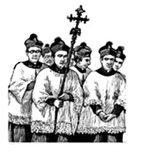
The Man Who Was Ratzinger
AD EXTRA -- POPE BENEDICT XVI & THE WORLD
For some the reality was just too terrible to contemplate. On April 19 the Sacred College of Cardinals voted to entrust the keys of Peter to Pope John Paul II’s closest collaborator: Joseph Cardinal Ratzinger. “He has the most appalling reputation around the world as someone who has squashed theology and persecuted theologians,” opined Margaret Hebblethwaite, a columnist for the liberal Catholic Tablet in Britain. “He is the chief of the thought police, the master of the inquisition.” As the Vatican’s longtime supreme custodian of doctrine, Cardinal Ratzinger was necessarily at the epicenter of many controversies involving the Catholic Church over the past two decades. His stellar defense of the Faith in the face of opposition by radical feminists, homosexual activists, and secular fundamentalists is unparalleled in modern times. It is not surprising then that the election of Pope Benedict XVI has met with much gnashing of teeth among liberal pundits (and much cheering elsewhere).
The irony is rich: For years — decades, even — certain Church reformists pined for the death of Pope John Paul II. Discontent with what they considered his conservative style of Church governance, they howled about the necessity that John Paul’s successor be more open to the winds of change in the world, willing to adapt the Church to the whims of man as they blow hither and yon. When it became clear that the Iron Pope was not going to give in easily to sickness or disease, they pushed for a papal resignation. The assumption was that once Karol Wojtyla was consigned to a Polish monastery, the Catholic Church would be primed for a “pendulum papacy.” There is a saying: A fat Pope is always followed by a thin one, which is an oblique way of acknowledging that a new pontiff is invariably different — sometimes very different — from his immediate predecessor.
The reformists interpreted this adage to mean Karol Wojtyla would be followed by a man who would rubber-stamp their agenda to recast Catholic truths as falsehoods. The pendulum pope, it was hoped, would overturn the controversial moral stands taken by the Church and John Paul II. He would dispense with the discipline of priestly celibacy; he would permit the ordination of women, of “gays,” of lesbians. He would condone abortion and euthanasia, hand out condoms (especially in Africa), bless same-sex “marriages,” appoint liberal bishops, promote New Age spirituality, withdraw the indult for the traditional Latin Mass, and extol the virtues of guitar liturgies and burlap banners.
Alas, it was not to be. In the words of dissident Swiss theologian Hans Küng, the election of Benedict XVI was “an enormous disappointment for all those who hoped for a reformist and pastoral pope.” Bernd Goehring, leader of the liberal German group Kirche (Church) put it more succinctly: “We consider the election of Ratzinger a catastrophe.”
In a manner of speaking, the reformists may get their “pendulum papacy” after all, but not on the terms they would have liked. To be sure, Benedict XVI has a great deal in common with his predecessor, but Joseph Ratzinger is certainly his own man, no mere pale reflection of the late Pontiff. In fact, Benedict’s papacy will likely be defined, not so much by its similarities with the previous pontificate, but by a contrast in substance and style. No one doubts Benedict will uphold and defend the Catholic Faith as did John Paul. Yes, there will be continuity, but that continuity will likely come by way of translating the guidelines of the Wojtyla pontificate into institutional reality. Ratzinger has proven he is up to the task.
You May Also Enjoy
The Church has attempted to correct the excesses of radical liberation theology and that “dualistic” Christianity that views the Church as a fortress and calls on Christians to retreat within its walls.
The subsidiarity of the body is a testament to the theology of the body; it says that the human body is a marvel fit to host the human soul.
When considering Muslim tolerance, one might inquire: Are Muslim attitudes toward drinking alcohol tolerant? And how about free speech? Women's rights? Freedom of religion? Music and Art?

